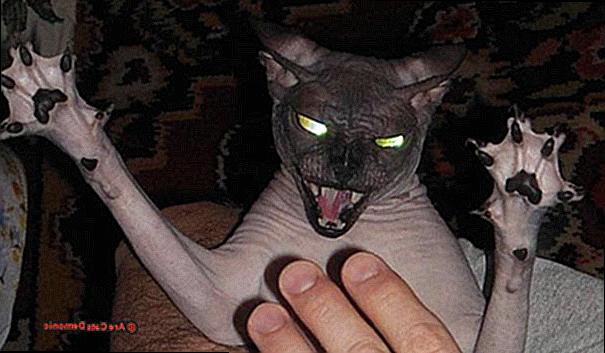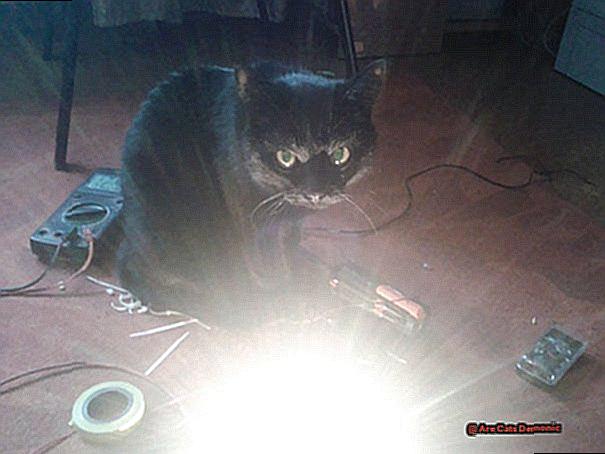Today, we’re tackling a topic that has sparked heated debates for centuries – the alleged demonic nature of our feline friends. Now, before you start side-eyeing your fluffy companion, let’s dig deeper and see if there’s any truth to this age-old belief.
So, grab a snack and get ready to explore the truth behind whether our beloved pets are truly demonic or simply misunderstood creatures.
Are Cats Demonic?
Contents
For centuries, cats have been associated with demonic entities and dark forces. From ancient civilizations to modern-day pop culture, these furry creatures have been portrayed as agents of evil. But is there any truth to this belief? As a cat owner and expert, I am here to debunk this myth and shed light on the fascinating history of cats.
The belief that cats are associated with the devil dates back to ancient Egypt, where they were worshipped as symbols of the goddess Bastet, who was believed to be a protector of the underworld. However, in Christianity, cats were seen as companions of witches and were persecuted during the Middle Ages. These beliefs have persisted over time and are still prevalent in some parts of the world.
But let’s get one thing straight – there is no scientific evidence to support the notion that cats are demonic. Many experts argue that these beliefs stem from superstitions and cultural biases rather than facts. In fact, cats have been domesticated for thousands of years and have been valued for their ability to catch rodents and protect crops from pests.
So why do some people associate cats with being “evil” or “demonic”? One reason could be their mysterious behavior and nocturnal activities. But this can be attributed to their natural instincts as predators and their need for physical and mental stimulation. Cats are also known for their acute awareness of their surroundings, which can make them seem like they are aware of things that we cannot see.
Additionally, cats have been known to exhibit unusual behavior such as staring at empty spaces or acting skittish, which has led some to believe they can sense or see supernatural entities. However, experts suggest that these behaviors can be explained by their heightened senses and acute awareness of their surroundings.
It is also important to note that cats have been proven to have a positive impact on mental health. Studies have shown that owning a cat can reduce stress and anxiety levels in their owners. This further contradicts the idea that they are demonic or evil creatures.
Pop Culture’s Influence on the Perception of Cats as Demonic Creatures
“Don’t Believe the Hype: Debunking the Myth of Cats as Demonic Creatures”
From ancient civilizations to modern media, cats have been portrayed as demonic creatures throughout history. But where did this belief come from? As an expert on the topic of pop culture’s influence on the perception of cats, I am here to delve into the origins of this myth and debunk it once and for all.
It all started in ancient civilizations such as Egypt and Greece, where cats were associated with deities like Bastet and Hecate. While these goddesses were often depicted with cats, they were not seen as evil or demonic. In fact, cats were revered as sacred animals in Egyptian culture.
Fast forward to the Middle Ages, a time when superstition and the spread of Christianity fueled the fear and negative portrayal of cats. They were often associated with witchcraft and considered familiars of witches, leading to their persecution during the infamous witch trials in Europe and America.
This fear of cats continued through various forms of media, from literature to art and eventually film and television. One notable example is Edgar Allan Poe’s short story “The Black Cat,” where a black cat is portrayed as a symbol of evil. But let’s not forget that Poe was a master of horror and fiction – his stories should not be taken as factual evidence.

Even in popular culture, we see cats being portrayed as demonic creatures. Characters like Salem from “Sabrina the Teenage Witch” and Church from “Pet Sematary” are often seen as mischievous or sinister due to their feline form. But again, these are fictional characters created for entertainment purposes.
As a cat owner and expert, I can confidently say that cats are far from being demonic creatures. They may have a mischievous streak and a sassy attitude, but that doesn’t make them evil. In fact, studies have shown that owning a cat can have numerous benefits for one’s mental and physical well-being.
So why has this myth persisted for so long? It’s simply a result of cultural biases and superstitions, not based on any factual evidence. As society becomes more educated and open-minded, we must let go of these outdated beliefs and appreciate cats for the loving and playful companions they are.
Religious Beliefs and Texts That Contribute to the Notion of Cats Being Demonic
Cats have been a beloved companion to humans for centuries, yet they have also been feared and associated with dark forces. The idea of cats being demonic creatures has been ingrained in our society for centuries, but where did this belief come from? In this expert analysis, we will explore the various religious beliefs and texts that have contributed to this notion.
Ancient Egyptian mythology is often cited as the origin of cats being seen as divine and magical beings. These feline creatures were worshipped and revered by the Egyptians. However, when Christianity spread throughout Egypt, cats became associated with witchcraft and evil. This shift in perception is evident in the depiction of cats in art during this time, with many paintings showing them as demonic creatures.
The Bible also mentions cats in a negative light, specifically in the Book of Isaiah where it says “wild cats shall meet with hyenas; the goat demon shall cry to his fellow; indeed, there the night bird settles and finds for herself a resting place” (Isaiah 34:14). This passage has been interpreted by some as a reference to cats being associated with demons and evil spirits.
In medieval Europe, cats were often linked to witches and black magic. It was believed that witches could transform into cats, and therefore, cats became associated with evil and the devil. This association was strengthened during the infamous Salem Witch Trials in colonial Massachusetts, where many of the accused witches were said to have had familiar spirits in the form of cats.
The superstition of black cats being bad luck also stems from these religious beliefs. Black cats were believed to be the companions of witches and bringers of misfortune. Even in Islamic beliefs, cats are seen as unclean creatures and are not allowed in mosques or to touch holy books.
Moreover, the association between cats and demons is also evident in various folktales and legends from different cultures. For example, in Japanese mythology, there is a demon called Nekomata that can transform into a cat with two tails.
Despite these negative portrayals, cats have also been seen as guardians against evil in some religions. In ancient Norse mythology, the goddess Freya was said to ride a chariot pulled by cats. In Buddhism, the bodhisattva Manjusri is often depicted with a cat as a symbol of wisdom and compassion.
Scientific Explanations for Cat Behavior That May Be Perceived as “Demonic”
Cats have long been associated with supernatural powers, from ancient Egyptian gods to modern-day Halloween decorations. But as a cat behavior expert, I can assure you that these feline creatures are far from being demonic. In fact, there are scientific explanations behind many of their actions that may be perceived as “demonic” by some.
One factor that may contribute to this perception is cats’ heightened senses. Their acute hearing and sense of smell allow them to detect things that humans cannot, causing them to react in seemingly strange ways. For example, your cat may suddenly stare at a spot on the wall or run away from an empty room because they can sense something that we can’t.
Additionally, cats’ agility and grace may be seen as supernatural abilities. However, their ability to jump high and squeeze into small spaces is simply a result of their flexible bodies and strong muscles. Similarly, their instinct to knock objects off shelves or attack moving objects is not malicious but rather a natural hunting behavior.
Some owners may also interpret their cat’s nighttime “zoomies” as demonic possession. But in reality, this burst of energy is just a result of their natural nocturnal instincts and energy levels. And while cats may appear aloof and independent, this is just part of their innate behavior as non-pack animals.
Lastly, excessive grooming has been linked to demonic possession in the past. But this behavior is actually just a natural way for cats to clean themselves and regulate their body temperature. If you notice your cat grooming excessively, it may be a sign of stress or anxiety that can be addressed through proper care and attention.
Debunking Myths About Cats Being Demonic
As a cat behavior expert, I have heard countless stories of people being afraid of cats because of their association with witchcraft and the occult. But let me tell you, as someone who has spent years studying and observing these creatures, there is no truth to this myth. Cats are not demonic beings; they are simply misunderstood.
Let’s start by addressing the elephant in the room – their glowing eyes in the dark. Yes, it may seem spooky, but this is actually a natural phenomenon caused by a layer of tissue behind their retina called the tapetum lucidum. This layer reflects light and gives cats superior night vision – a useful adaptation for their nocturnal hunting habits. But this has been misinterpreted as a sign of evil by those who fear cats.
Furthermore, cats have been domesticated for thousands of years and have been revered by different cultures around the world. In ancient Egypt, they were considered sacred animals and were even mummified after death. Does that sound like something a demonic creature would be associated with?
The belief that cats are demonic can also be traced back to the Middle Ages when they were often seen as companions of witches and accused of being their familiars. This was due to their independent nature and nocturnal behavior, which was misunderstood by people at that time. And let’s not forget that any animal, including cats, can exhibit aggressive or destructive behavior if not properly trained or cared for.
But here’s the truth about cats – they are intelligent, social, and loving animals. They form close bonds with their owners and exhibit signs of empathy. In fact, there have been studies conducted on cat behavior that debunk the myth of them being demonic creatures. They even have a calming effect on humans and can sense when their owners are distressed.
It is also worth mentioning that cats play an important role in controlling rodent populations, which can be beneficial for humans. Their hunting instinct is simply a natural behavior and not a sign of evil intent. As responsible pet owners, it is our duty to educate ourselves and others about the true nature of cats and dispel these harmful beliefs.
The Positive Effects of Cats on Human Health and Well-Being
Cats have been domesticated for thousands of years, and over time, they have become one of the most beloved pets in the world. Despite their popularity, some people still hold onto the belief that cats are demonic creatures. As a cat behavior expert, I can confidently say that this couldn’t be further from the truth. In fact, numerous studies have shown that owning a cat can have many positive effects on human health and well-being.
So if you’re a proud cat owner, keep reading to discover the latest research findings and personal insights on how your feline friend can benefit your overall health and well-being.
Stress and Anxiety Relief
We all experience stress and anxiety at some point in our lives, but did you know that simply petting a cat can help alleviate these feelings? Studies have shown that interacting with cats can lower blood pressure and release feel-good hormones like oxytocin, which helps reduce stress and anxiety.
Calming Presence
The gentle purring of a cat is not only soothing to the ears but also has a calming effect on our minds. This can be especially beneficial for individuals with mental health issues such as depression or PTSD. The comforting presence of a cat can provide a sense of peace and security, helping to alleviate symptoms.
Physical Health Benefits
Cats not only have emotional benefits but also physical ones. The vibrations from a cat’s purring have been found to promote healing and pain relief, making them ideal companions for those recovering from surgeries or illnesses. Furthermore, owning a cat has been linked to a decreased risk of heart disease and stroke, possibly due to the stress-reducing effects of their companionship.
Detecting Illness
While there is no scientific evidence to support this claim, many cat owners have shared stories of their feline friends alerting them to potential health issues. Cats have a heightened sense of smell and may be able to detect changes in their owner’s body chemistry, making them excellent companions for those with health concerns.
Low-Maintenance Pets
Unlike dogs, cats do not require daily walks or constant attention, making them ideal companions for busy individuals or those who may struggle with daily tasks. This low-maintenance aspect of cat ownership can be particularly beneficial for older adults or people with health limitations.
How to Properly Care for Your Cat to Ensure a Happy and Healthy Relationship
Cats are often perceived as enigmatic and mysterious creatures, with some even associating them with dark magic and demonic powers. But as a cat care expert, I can assure you that these beliefs are simply myths and cats are just like any other domesticated animal. In fact, they can make amazing companions and provide countless benefits to their owners. In this guide, I will share with you the essential steps to properly care for your feline friend and debunk the myth of cats being “demonic.”
First and foremost, it’s important to understand your cat’s natural behaviors and needs. Cats are independent creatures and require plenty of mental stimulation to thrive. This means providing them with toys and activities that challenge their hunting instincts and keep them entertained. From laser pointers to puzzle toys, there are endless options available to keep your cat mentally stimulated.
Proper nutrition is also crucial for a cat’s overall health and well-being. As obligate carnivores, cats need meat in their diet to meet their nutritional needs. It’s important to provide a balanced diet of high-quality food, consult with your veterinarian for specific recommendations based on your cat’s age, breed, and any health conditions. And remember, don’t overfeed your cat as obesity can lead to various health problems.
Regular grooming is necessary for cats, especially those with longer hair. This includes brushing their coat to prevent matting and hairballs, trimming their nails to avoid discomfort, and cleaning their ears and teeth. Not only does this keep them looking and feeling their best, but it also prevents potential health issues.
Creating a safe and comfortable environment for your cat is essential for a happy relationship. This includes having a designated litter box area, scratching posts for them to fulfill their natural instinct to scratch, and perches for them to climb and play on. Providing fresh water at all times is also important for their hydration needs.
But perhaps the most crucial aspect of caring for your cat is building a strong bond with them. Despite their reputation for being aloof, cats still crave love and attention from their owners. Spending quality time playing, cuddling, and grooming your cat will help create a happy and healthy relationship between the two of you.
Now, let’s address the elephant in the room – the myth of cats being demonic. This belief stems from centuries-old superstitions and religious beliefs. For example, in ancient Egypt, cats were revered as gods but in some other cultures, they were seen as companions of witches and demons. However, there is no evidence to support these claims.
In fact, science has provided explanations for some of the behaviors that are often associated with cats being “demonic.” Their nocturnal nature, glowing eyes in the dark, and ability to move silently are simply a result of their natural instincts as predators.
Conclusion
In conclusion, the belief that cats are demonic creatures is nothing more than a baseless myth fueled by superstition and cultural biases. As we have explored in this article, there is no scientific evidence to support this idea. In fact, cats have been domesticated for thousands of years and have been valued for their innate abilities such as catching rodents and providing companionship to humans.
From ancient civilizations to modern pop culture, cats have often been portrayed as agents of evil. But as responsible cat owners and experts, it is crucial to educate ourselves and others about the true nature of these creatures. While some may perceive certain feline behaviors as “demonic,” they can easily be explained by their natural instincts and heightened senses.
Moreover, owning a cat has numerous positive effects on human health and well-being. From reducing stress and anxiety levels to providing companionship for those with mental health issues, cats are much more than just pets – they are loving and loyal companions.
Properly caring for your cat involves understanding their natural behaviors, providing them with a balanced diet, regularly grooming them, creating a safe environment for them, and building a strong bond through quality time together.
By doing so, we can debunk the unfounded myth of cats being demonic creatures and appreciate these furry friends for the amazing companions they truly are.






